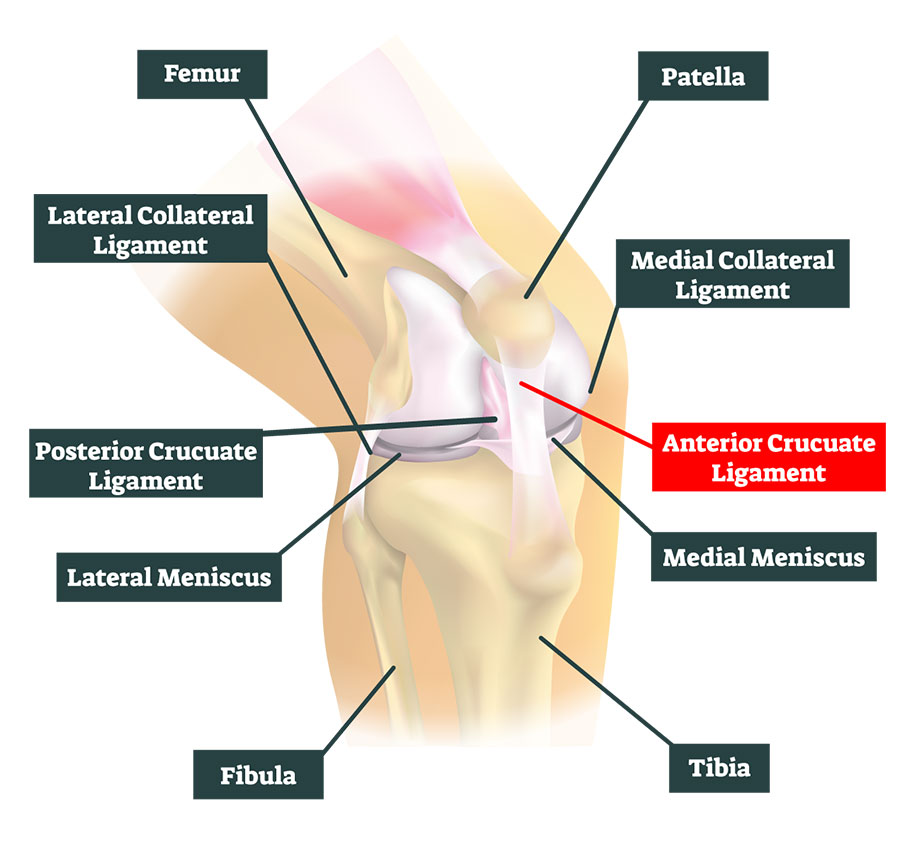Are you an athlete? Does your knee hurt more than usual? There is a high chance that you suffered an anterior cruciate ligament injury. Torn ACLs are quite common among athletes. Sure, the injury can happen to others too, but it is highly prevalent in people who play sports.
The ACL(Anterior Cruciate Ligament)
Both of our legs have four ligaments to provide knee joint stabilization. The anterior cruciate ligament is arguably the most important yet fragile part of our knees. ACL injuries are more common than you would think. Anterior cruciate ligament sprains or tears mostly occur due to a sudden pivot or direction change against locked knees.
You will hear a quick yet hurtful pop when this injury happens. Pain and swelling will take over a minute after the sprain or tear. Injuries like these are quite popular in professional athletes participating in contact sports like basketball, football, boxing, mixed, martial arts, rugby, etc.
However, it can also happen when you least expect it. Numerous people sprained their anterior cruciate ligaments while climbing stairs, working out, or simply walking.
ACL Injury Symptoms
While swelling and popping are common symptoms of a torn anterior cruciate ligament. Here are some other signs that indicate sprained ACLs.
- Excessive soreness on the knee and surrounding areas
- Difficulty putting weight on the injured leg
- Inability to achieve a complete range of motion
- Discomfort when standing, walking, jogging


Types of ACL Tears
First Grade Sprains
Second Grade Sprains
Third Grade Sprains
Third-grade sprains are complete ligament tears. The patient’s ACL tears in multiple pieces and is unable to control or stabilize the kneecap. It would be best if you consulted a physician to assess the injuries extent.
They will evaluate your knee’s range of motion by comparing it to your leg’s movements before providing you a diagnosis. In some cases, physicians may utilize X-rays or MRIs to identify soft tissue injuries, bone damage, and various other knee ligament related issues.
How Can I Recover from this Injury?
Your recovery speed mostly depends on your tear’s severity. Minor sprains can heal without surgeries – doctors may prescribe you regenerative medicine therapy and ask you to rest. However, you may need to go under the knife if your ligament tears are severe.
However, there is good news – you can return to your pre-injury condition and play your favorite sport regardless of your injury’s extent. However, you must follow the doctor’s orders and follow every rehabilitation and physical therapy exercise they prescribe.
Resting is also critical – do not try to rush your recovery process as you may worsen things. You would be surprised to learn that athletes who suffered similar injuries in the eighties or nineties had to retire. There wasn’t adequate information and research to recover from ligament injuries.
Things are vastly different now, and people with the severest of ACL tears can return to action within months after surgery and rehab.
Strengthen Your Muscles
As discussed earlier, most doctors and physiotherapists recommend various exercises to recover from ACL injuries. People with minor tears do not require surgery in most cases. So, they can start strengthening their musculature near the knee after resting for a week or two (whatever your doctor recommends.)
Some physiotherapists ask patients to jog or walk on flat surfaces and in a straight line. It is arguably the safest way to strengthen the muscles around your knee.
Should I Undergo ACL Surgery?
Doctors recommend active patients and young athletes to undergo anterior cruciate ligament repair surgeries as soon as possible. Not heeding their advice could further damage the meniscus and cartilage inside your knee, which could lead to osteoarthritis and other problems in the long run.
Fortunately, anterior cruciate ligament surgeries are safe and have excellent success rates.
Yes, You Can Return to Your Pre-Injury Form
You will find hundreds, if not thousands of athletes undergoing this procedure every year. They return to their pre-injury conditions soon and can perform in high-level tournaments like it is nothing. However, make sure you rest and go to rehab or physiotherapy sessions to speed up your recovery process.
Follow these tips for a Speedy Recovery
Post Operation Instructions
Your surgeon will provide you specific instructions after examining your condition. He or she may schedule numerous medical visits in the proceeding weeks and refer a physical therapist to ensure you are following a rehabilitation program.
You must adhere to your doctor’s recommendations and steer clear from doing anything by yourself as you may aggravate your injury instead of healing it. It would be best to ask questions to ensure everything is clear rather than being confused.
Don’t Skip the Rehab Exercises.
Nutrition Can Work Wonders
Eating the right foods can jumpstart your recovery process, ensuring your body heals rapidly. Doctors recommend eating lean proteins, fresh citrus, and dairy. Most nutritionists recommend including leafy green plants like spinach to your diet. It would also be best if you cut down on soda, alcohol, caffeine, and sugar use.
Rehabilitation periods can vary from person to person. So, there is nothing wrong if the resting and rehab time prescribed by your surgeon is longer than others. Find support, be patient, and follow the program for a speedy recovery.
The Fitness Bible-Your Ultimate Guide To Bodybuilding And Diet:
Bodybuilding For Conditioning And Health


- Your email address will never be shared with anyone else. We respect your privacy.


